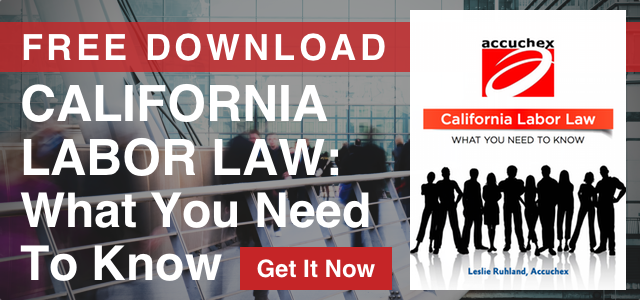Employers are concerned about compliance with overtime rules, and rightly so. The so-called Final Rule is still on hold and no clear resolution is forthcoming.

Compliance is a critical issue for employers and the legal wranglings between current and past federal administrations over the DOL's "Final Rule" is distressing. Many employers have already opted to make the necessary changes to comply with the new rules even though this is not legally required... yet.
And most others and waiting to see how the legal fight plays out over the course of this year before committing to costly changes.
The Battle Over the Final Rule Continues
The AFL-CIO, the nation’s largest union federation, has threatened to oppose the Trump administration and plans to fight any attempts to block or alter the Final Rule changes that the Obama administration put forward.
In fact, the AFL-CIO plans to sue the Department of Labor if it “dilutes” the final overtime rule that was supposed to take effect in December of 2016 before the court injunction was issued.
President Trump has already indicated his disposition towards nixing the pending Final Rule changes and these are currently "on hold" as the result of a court injunction late last year. His new nominee for Secretary of the Department of Labor (DOL) shares those sentiments.
According to an article from HRMorning.com,
Employers... got a glimpse of Trump DOL nominee Alexander Acosta’s feelings toward the DOL’s overtime changes.
He said it was unfortunate the threshold hadn’t been updated since 2004 and promised those at the hearing he was:
“very sensitive to the fact that it hasn’t been updated since 2004. We now see an update that is a very large revision and something that needs to be considered is the impact it has on the economy, on nonprofits, on geographic areas that have lower wages.”
However, Acosta did say doubling the amount would not only create “a stress on the system,” it might also overstep the DOL’s legal authority.
Whether the AFL-CIO really plans to defend the overtime changes in court, as it has threatened, or will simply acquiesce to a legal compromise, remains to be seen. Either way, it is going to be a contentious issue that has yet to be resolved.
The Current Status of Overtime Rules for Employers
In the meantime, while the legal battle continues between labor unions, employer lobbies, and the new federal administration, businesses must still comply with the overtime regulations and - possibly - the new rules.
The DOL, under former President Obama, issued a final rule revising the FLSA overtime regulations in May 2016. On November 22, a federal district court judge in Texas placed a temporary injunction, effective nationwide, on the revised rule, preventing it from taking effect on December 1, 2016 as originally slated.
This means that the rule's implementation and enforcement are on hold. The induction has been appealed to the 5th Circuit Court of Appeals, and on February 22, 2017, the DOL moved for an additional 60-day extension to file its brief, citing the absence of a confirmed Labor secretary. That extension will end on May 1 and the confirmation of Labor Secretary nominee Acosta has yet to be determined.
The Final Rule, if eventually allowed, will accomplish the following:
- The annual salary threshold for exempt positions will more than double from $23,660 to $47,476.
- Employers will be allowed to use nondiscretionary bonuses to satisfy up to 10 percent of the general salary threshold, provided the incentives are made on a quarterly or more frequent basis.
- There will be no change in the general duties test used to determine whether employees earning more than the salary threshold must be classified as nonexempt from overtime, including the exemptions for executive, administrative and professional positions, among others.
- For highly compensated employees (HCEs), who may be classified as exempt if they meet the criteria of a less-stringent duties test, the final rule will raise the annual HCE salary threshold from $100,000 to $134,004.
In the meantime, it is quite likely that this version of the overtime regulations will not be realized, but that another, less radical increase will take place.
For now, most employers have chosen to take a "wait and see" approach and continue to comply with the existing rules.
Overtime Pay: What Rules Apply for Now

The federal Fair Labor Standards Act (FLSA) applies three tests, all of which generally must be satisfied for an employee to be exempt from the FLSA's minimum wage and overtime requirements: a salary basis test, a salary level test, and a duties test.
According to the Fair Labor Standards Act website, those employees whose jobs are included by the FLSA are either "exempt" or "nonexempt." All nonexempt employees are entitled to overtime pay, but exempt employees are not. Most employees covered by the FLSA are nonexempt.
The FSLA currently states that,
With few exceptions, to be exempt an employee must (a) be paid at least $23,600 per year ($455 per week), and (b) be paid on a salary basis, and also (c) perform exempt job duties. These requirements are outlined in the FLSA Regulations (promulgated by the U.S. Department of Labor). Most employees must meet all three "tests" to be exempt.
The website goes on to point out that employees who earn more than $100,000 per year are "almost certainly exempt."
In addition to the salary level requirements, there is the salary basis test. The FSLA states that the salary basis test applies only to reductions in monetary amounts. Employer actions such as requiring an employee to charge absences from work to leave accruals do not constitute a reduction in "pay," since the monetary amount of the employee's paycheck remains the same.
The rules describe salary level this way,
Generally, an employee is paid on a salary basis if s/he has a "guaranteed minimum" amount of money s/he can count on receiving for any work week in which s/he performs "any" work. This amount need not be the entire compensation received, but there must be some amount of pay the employee can count on receiving in any work week in which s/he performs any work.
Finally, there is the duties test. Simply put, an employee whose work is primarily supervisory is considered exempt. Job duties are exempt executive job duties if the employee:
- Regularly supervises two or more other employees, and also
- Has management as the primary duty of the position, and also,
- Has some genuine input into the job status of other employees (such as hiring, firing, promotions, or assignments).
Stay Informed of Overtime Labor Laws
Changes in regulations expand the potential of risk for employers, require new workplace postings, or mandate updates to existing workplace policies. We recommend that all employers consult with experienced employment counsel to ensure compliance.
Accurate and timely management and compliance practices are required for every business and every payroll professional. But there are options.
Accuchex, a reputable payroll management services provider, can not only relieve you of the burden of your ongoing payroll process demands, but can potentially prove to be a more cost-effective solution, as well.
Click this link o get your free download of our Payroll Outsourcing Guide. Or click the button below to learn what you need to know about labor law in California. For more information, feel free to call Accuchex Payroll Management Services at 877-422-2824.



